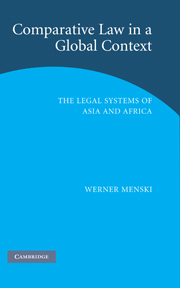Book contents
- Frontmatter
- Contents
- Preface and acknowledgments
- Table of cases
- Table of statutes
- List of abbreviations
- PART I Comparative framework
- PART II Regional comparisons in a global context
- Introduction
- 4 Hindu law: the search for appropriateness
- 5 Islamic law: God's law or men's law?
- 6 African laws: the search for law
- 7 Chinese law: code and conduct
- Conclusion: towards global legal realism
- References
- Index
6 - African laws: the search for law
Published online by Cambridge University Press: 09 November 2009
- Frontmatter
- Contents
- Preface and acknowledgments
- Table of cases
- Table of statutes
- List of abbreviations
- PART I Comparative framework
- PART II Regional comparisons in a global context
- Introduction
- 4 Hindu law: the search for appropriateness
- 5 Islamic law: God's law or men's law?
- 6 African laws: the search for law
- 7 Chinese law: code and conduct
- Conclusion: towards global legal realism
- References
- Index
Summary
The sub-title of this chapter indicates deep problems in the discourse on African laws. For many reasons, African laws and African jurisprudence have always faced a barely hidden undercurrent of denial of African laws and their potential contributions to jurisprudence. Previous chapters demonstrated a serious deficiency of plurality-consciousness in understanding non-Western laws, mainly implicating positivist presuppositions, which have also heavily impacted on how African laws are perceived. While Islamic and even Hindu religious law dogma tends to overemphasise the place of divine legislation, thereby conflating positivism and natural law, scholarship about African laws remains heavily influenced by a brand of deficiency in plurality-consciousness which denies the existence of law in social contexts. Positivist bias is strongly reflected, leading to claims that there was no proper law in traditional Africa. Comparative law scholarship, too, has struggled with accepting that Africans have ‘proper’ law. More recently, the voices of Africa have been in danger of being drowned out by assertions of global human rights, to the effect that there is nothing of value in traditional African laws to contribute towards a better future for the world as a whole and the understanding of law as a global phenomenon.
A plurality-conscious perspective on the laws of Africa cannot ignore the people of Africa and their many cultures and languages. But can one even speak of ‘African law’, given this immense diversity?
- Type
- Chapter
- Information
- Comparative Law in a Global ContextThe Legal Systems of Asia and Africa, pp. 380 - 492Publisher: Cambridge University PressPrint publication year: 2006
- 1
- Cited by

